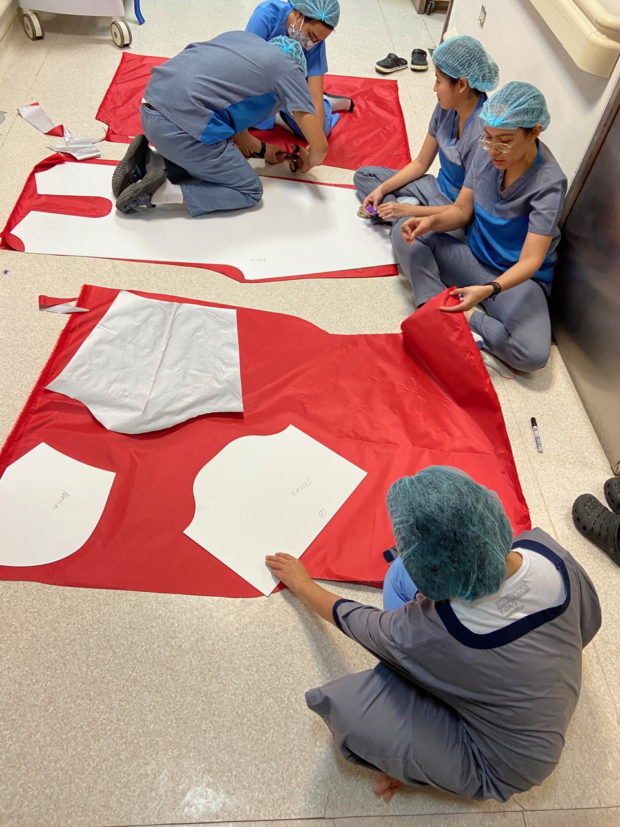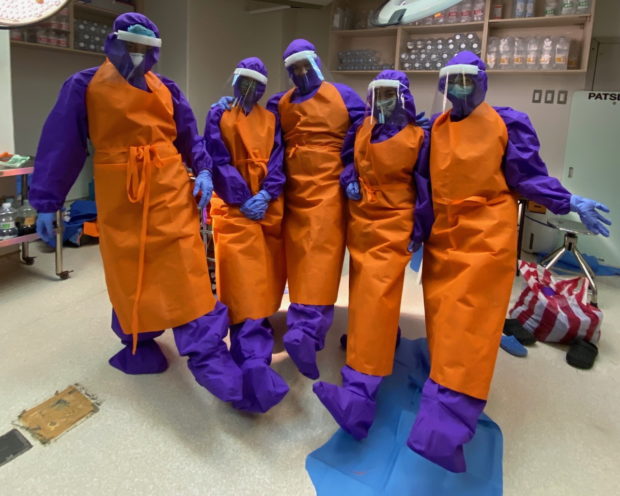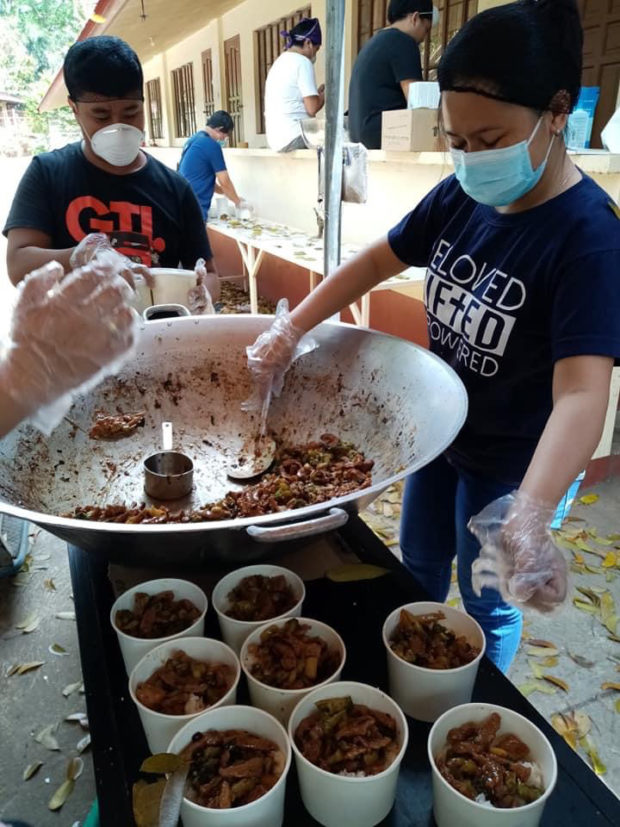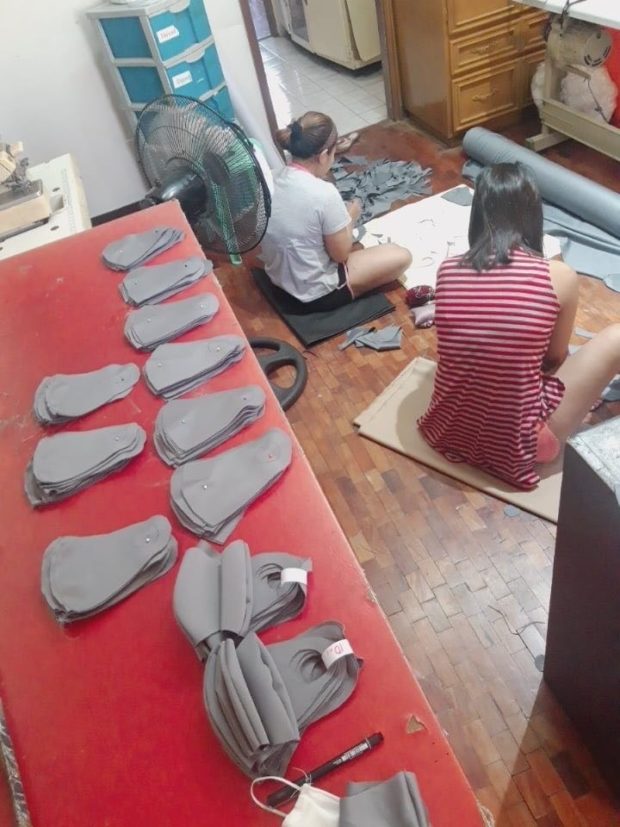Heroes among us: Battling the coronavirus pandemic
Crisis births heroes. In this time of national public health emergency due to the coronavirus pandemic, Filipinos, regardless of their status in life, go out of their way to reach out and help others. These are their stories.
NORTHERN AND CENTRAL LUZON: ‘Bayanihan’ spirit alive
Instead of creating ball gowns and fancy clothes, a family of dressmakers in Alaminos City, Pangasinan province, is making face masks out of fashion fabrics as the country faces a shortage of protective shields for medical professionals fighting to stop the spread of the new coronavirus disease (COVID-19).
In one corner of her family’s shop, Apple Joy Boutique, Apple Joy Bacay, 25, helps her parents and brother sew the masks that will be donated to front-liners against the virus outbreak.
Her mother, Apolonia, a city councilor, thought of giving masks for free after learning that stores were running out of supply. She had stocks of fabrics, like satin, which could no longer be sewn into gowns as demand for these materials had dropped after events were canceled due to COVID-19.
In Mangaldan town, also in Pangasinan, Noella Penullar, a single mother of two teenage girls, has made more than 300 face shields that were given to the Region I Medical Center, Pangasinan Provincial Hospital and Mangaldan Infirmary.
“All the materials I use are donations from former classmates and friends. I only make them,” Penullar said.
Article continues after this advertisementIn Pampanga province, top couturiers made more than 4,000 washable masks in a week, which they donated to health workers and policemen manning checkpoints.
Article continues after this advertisementGoing by the name “Pampanga Designers,” the couturiers and their staff are still busy sewing masks at their ateliers.
In Subic Bay Freeport, businessmen have improvised face shields for doctors and health workers, while a group of women in the port’s Binictican area is helping an Aeta community in Pastolan Village sell vegetables and other products.
In Bulacan province, some workers in the training centers of the Technical Education and Skills Development Authority have made more than 12,000 face masks for front-liners.
In Nueva Ecija province, scientists and researchers from Central Luzon State University started producing ethyl alcohol and hand sanitizer to augment the dwindling supply in the market.
Some farmers and stall owners in Benguet’s provincial capital of La Trinidad donated vegetables to ease hunger in communities that were put on lockdown.
SOUTHERN LUZON: Cooks feed front-liners
Shortly after the Batangas provincial government announced a massive community quarantine, Precious Leaño left their home for Lipa City.
That same week, she and four others in her team had gathered enough fresh food ingredients, arranged the deliveries through several checkpoints, and dished out the first 250 meals of beef broccoli and rice for the health workers of Batangas Medical Center.
“Be a person for others. This is the call of the times,” said Leaño, a cultural worker and cofounder of Art Relief Mobile Kitchen (ARMK).
Founded in 2013 by Leaño and photojournalist Alex Baluyut, ARMK advocates for community kitchens to serve hot meals during distressed situations. It has been through many typhoons, fires, armed conflict in Mindanao, and just recently, the Taal Volcano eruption in Batangas.
This time, the group found itself in the middle of a public health crisis triggered by COVID-19.
Leaño and her team stayed in their “locked down kitchen” at Redemptorist Church in Lipa, preparing hundreds of set meals every day for doctors, nurses and medical staff members of hospitals in Batangas, which by now are swamped with people infected by the virus.
About 45 kilometers away from home, Leaño couldn’t help but long for her family, where her partner, Baluyut, would later open up a community kitchen in Los Baños, Laguna. Baluyut’s team started cooking meals for the hundreds of University of the Philippines Los Baños students stranded in their dormitories.
Later, ARMK-Los Baños would also cook for the hospital staff, supermarket employees and village watchmen in the town from its kitchen set up in a barangay basketball court.
Leaño said the only way to beat the virus was to stay healthy and to also look after the health of the community.
In Camarines Sur province, Bernadette de los Santos, artist and founder of BidiBidi Bags, and her team have donated 3,000 masks to hospital workers and other front-liners in the Bicol region.
The Tabak Sangre Organization in Albay province made washable masks, while teachers and staff from Bicol University in Legazpi City pooled resources to produce face shields for front-liners.

LOOKING AFTER EACH OTHER Protective equipment and medical supplies for hospital workers, meals for communities, and masks for other front-liners are among the donations pooled by groups of citizens, rich or poor, across the nation as they contribute to efforts in fighting the spread of the new coronavirus disease in the country. —PHOTOS BY KARLSTON LAPNITEN, ADRIAN PE AND ARMK
VISAYAS: Color positivity in hospitals
Nurses and other health workers in Iloilo province are bringing color to their hospitals to counter the gloom while caring for COVID-19 patients.
Their hazardous material (hazmat) suits come in violet, yellow, yellow green and red colors, and designed and produced by volunteers.
“We want to spread positivity among patients and front-line workers and boost morale by using vibrant colors,” said Adrian Pe, a nurse at The Medical City Iloilo, who is also a fashion designer.
Pe, 28, said his team could not find neutral-colored materials for their own hazmat suits. But when he got 100 meters of fabric in violet, an idea hit him: colorful suits.
“It became a hit as nurses and other health workers were excited to wear suits based on their preferred color,” Pe told the Inquirer.
“We sent prototypes of the suits to other provinces who have asked our help so they can produce locally and provide livelihood to seamsters who are out of work,” Pe said.
In Aklan province, a family of teachers and a policeman in the town of Lezo has been sewing cotton face masks that they give out to hospital workers and police officers.
In Cebu province, a group of eight young women led a fund drive called #CourageCebu, in support of front-liners.
As of March 31, they had collected P1.5 million to buy supplies for front-liners at Vicente Sotto Memorial Medical Center, Cebu Doctors’ University Hospital, Perpetual Succor, Eversley Child Sanitarium and General Hospital, and the police.
They also bought multivitamins, canned goods, noodles, biscuits, coffee, milk and packed meals for daily wage earners who were affected by business shutdown due to the enhanced community quarantine.
Dianne Gandionco-Huang said her group, through #CourageCebu, had also extended help to front-liners in Bohol province and in Dumaguete City, Negros Oriental province.
In Negros Occidental province, the Negrense Volunteers for Change (NVC) has been making hospital gowns and face shields to help fill the shortage of personal protective equipment (PPE), as well as provide food assistance to families who have lost their means of livelihood since mid-March.
The foundation had so far delivered 6,000 face shields and 2,000 PPE to more than 50 hospitals and health centers across the province, said its president, Millie Kilayko.
NVC also delivered 266,233 meals to the needy through partner organizations, churches and the provincial government.
MINDANAO: Help in various forms
Young entrepreneurs in Cagayan de Oro City have pooled their resources to produce face shields for health personnel at Northern Mindanao Medical Center (NMMC), the center of the COVID-19 response in the region.
Raven Duran, 25, founder of the information technology firm XDevs, said he first wanted to manufacture 3D-printed ventilators. But he opted to make face shields instead, hooking up with the CDO Makers Response Group, which produces materials for medical front-liners.
As of March 26, the team had sent 348 face shields to NMMC.
In Butuan City, youth volunteers have started sewing face masks, aiming to produce about 500 pieces to distribute to front-line health workers in the city, said Cynth Zhepanee Nietes, president of the local Sangguniang Kabataan federation.
“While waiting for the masks, we distribute food in all the checkpoints in solidarity with our police, soldiers and medical personnel in the front lines,” she said.
The performing arts group, Kulture Revival Events Core, also plans to donate 1,000 masks.
In Surigao City, Hotel Tavern hired tailors to make hundreds of double-ply washable cloth masks out of spare linens.
“We distributed the second batch of 300 masks to the front-liners at checkpoints,” said Jake Miranda, one of the hotel owners.
A group of artists also crafted hundreds of improvised face shields out of transparent PVC and foam strips. “We used to print shirts but now we want to help and contribute in the fight against COVID-19,” said Mark Gonzaga of Diseño Creative Arts & Prints.
—REPORTS FROM YOLANDA SOTELO, CARMELA REYES-ESTROPE, TONETTE OREJAS, JOANNA ROSE AGLIBOT, ARMAND GALANG, KIMBERLIE QUITASOL, MARICAR CINCO, REY ANTHONY OSTRIA, MA. APRIL MIER-MANJARES, AUREA LYNNE PAZ, HAZEL VILLA, NESTOR BURGOS JR., CONNIE FERNANDEZ-BROJAN, CARLA GOMEZ, JIGGER JERUSALEM AND ERWIN MASCARIÑAS
For more news about the novel coronavirus click here.
What you need to know about Coronavirus.
For more information on COVID-19, call the DOH Hotline: (02) 86517800 local 1149/1150.
The Inquirer Foundation supports our healthcare frontliners and is still accepting cash donations to be deposited at Banco de Oro (BDO) current account #007960018860 or donate through PayMaya using this link.


